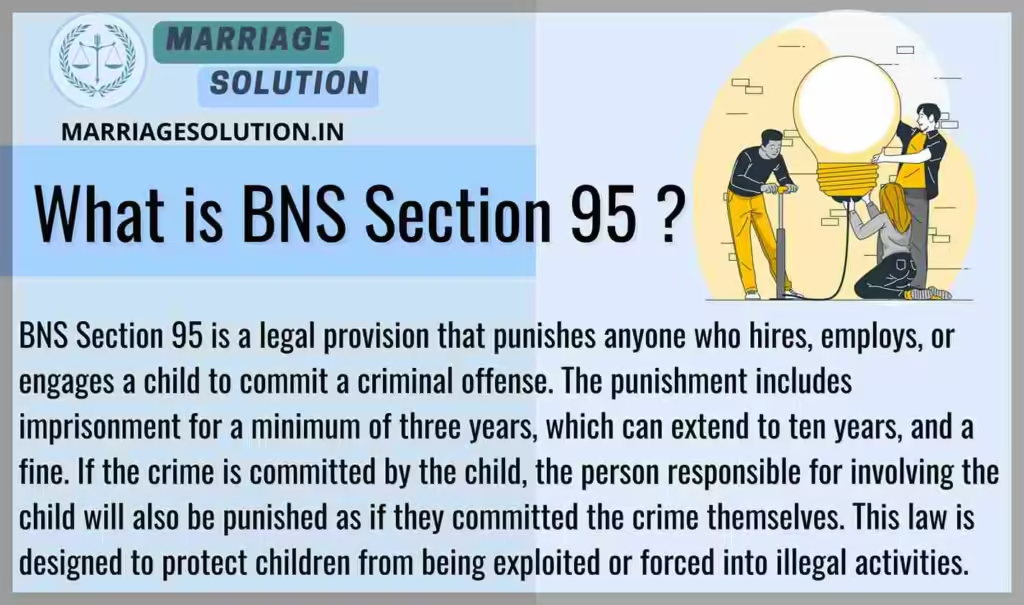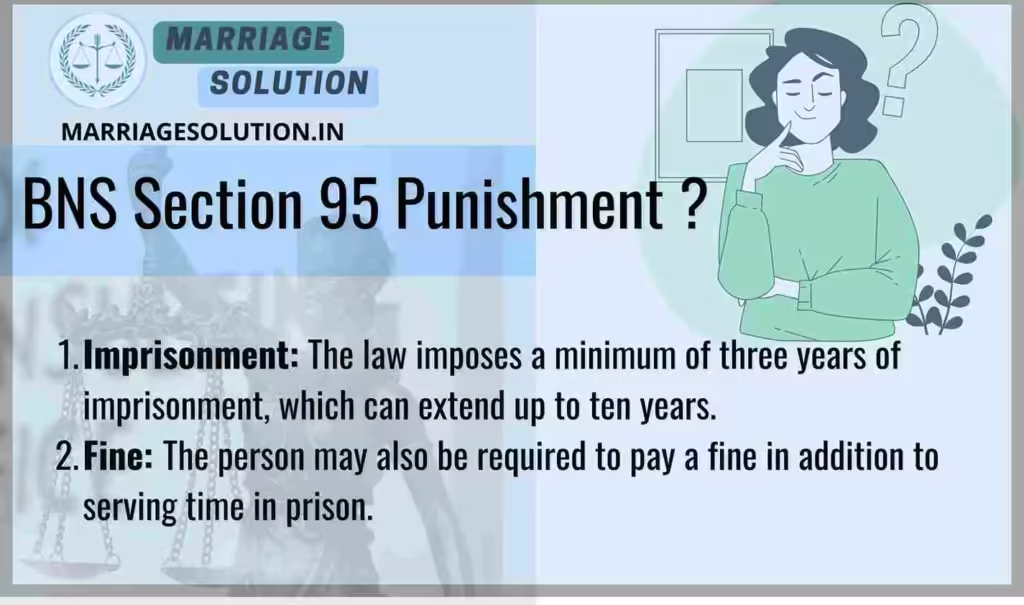Introduction of Section 95 BNS
Section 95 BNS, protects children from being exploited in criminal activities. It criminalizes the act of hiring, employing, or engaging minors to commit crimes such as theft, drug trafficking, or sexual exploitation. With a mandatory minimum sentence of three years, which can extend up to ten years, and additional liability if the crime is actually committed, this section acts as a strong safeguard against child exploitation and enforces strict accountability
What is section 95 of BNS ?
BNS Section 95 is a legal provision that punishes anyone who involves a child in committing a crime. It mandates a minimum of three years of imprisonment, which can go up to ten years, and a fine. The law also applies additional punishment if the crime is committed, treating the person who engaged the child as if they directly committed the crime. This section aims to protect children from being exploited or forced into criminal activities.

BNS 95 – Hiring child to commit crime law India
Sub-section (1):
“Whoever hires, employs or engages any child to commit an offense, shall be punished with imprisonment of either description for a term which shall not be less than three years but which may extend to ten years, and shall also be liable to fine.”
Sub-section (2):
“Where any person is punished under sub-section (1) and the offense is committed by the child, such person shall also be liable for that offense as if he had committed it himself.”
Detailed Explanation in Simple Language
Who can be punished?
This section applies to any person—gang leaders, employers, relatives, or strangers—who involves a child in committing any criminal act. The law does not excuse anyone, regardless of motive.
Key element – Hiring, employing, or engaging a child
The focus is on the act of using a child for crime. Whether the child is paid, persuaded, tricked, or forced, if an adult involves them in illegal activities, this law is triggered.
Mandatory Minimum Punishment
Unlike many sections, Section 95 has a minimum sentence of 3 years imprisonment. The court cannot reduce it. The maximum punishment can extend up to 10 years imprisonment, plus a fine. This strictness reflects the seriousness of child exploitation.
Additional Liability if Crime is Committed
If the child actually commits the crime, the adult who involved them is punished as if they committed the crime themselves.
- Example: If a child is made to steal by an adult, and the theft happens, the adult will be punished for both engaging the child and for the theft.
Scope of Offense – Includes Sexual Exploitation
This law covers not only crimes like theft, drug trafficking, or smuggling, but also sexual exploitation and child pornography. By making this clear, the law closes loopholes and ensures strong child protection.
Legal Nature of the Offense
- Cognizable: Police can arrest without a warrant.
- Non-Bailable: The accused does not have an automatic right to bail. The court decides whether bail can be granted.
- Triable by: Magistrate of the First Class initially, but if the child commits the crime, the case is transferred to the appropriate higher court.
Illustrations (Examples)
Example 3 (Not an Offense): A 13-year-old helps carry groceries home for a shopkeeper. Since no crime was committed, Section 95 does not apply.
Example 1 (Offense): A gang leader hires a 15-year-old to pickpocket passengers in a train. The leader is punishable with at least 3 years imprisonment and fine under Section 95.
Example 2 (Offense with Crime Committed): A man uses a 16-year-old to transport illegal drugs. The child is caught by police. Here, the man is not only guilty of engaging the child but will also be punished as a drug trafficker himself.
Section 95 BNS Overview
BNS Section 95 is a legal provision that punishes anyone who hires, employs, or engages a child to commit a criminal offense. The punishment includes imprisonment for a minimum of three years, which can extend to ten years, and a fine. If the crime is committed by the child, the person responsible for involving the child will also be punished as if they committed the crime themselves. This law is designed to protect children from being exploited or forced into illegal activities.
BNS Section 95: 10 Key Points
1. Ban on Using Children in Crimes
Section 95 clearly bans any person from hiring, employing, or using a child for committing any type of crime. Children are innocent and not mature enough to understand the law, so the responsibility lies on the adult. If someone misuses a child for illegal activities, they will be punished strictly.
2. Mandatory Punishment (3 to 10 years imprisonment)
The law sets a minimum punishment of 3 years in jail, which can go up to 10 years, along with a fine. This shows that the crime is very serious and cannot be ignored. The minimum punishment ensures that no guilty person can escape with just a warning or light penalty.
3. Additional Liability for the Adult
If the child actually commits the crime, the adult who pushed the child into it will be treated as the real offender. This means that the adult will be punished as if they themselves committed the crime, not just for using the child. For example, if a child is used for robbery, the adult faces robbery charges.
4. Covers Sexual Exploitation of Children
Section 95 also covers crimes where children are forced or tricked into sexual exploitation, pornography, trafficking, or other immoral acts. Such offenses are taken even more seriously, as they not only involve crime but also destroy a child’s dignity and future.
5. Non-Bailable Offense
This law makes the offense non-bailable, which means the accused cannot get bail as a matter of right. Only a court can decide whether to grant bail in special situations. This prevents criminals from easily escaping justice and continuing to exploit more children.
6. Cognizable Offense (Police Power to Arrest)
Since the offense is cognizable, the police can arrest the accused immediately without waiting for a court order. This is important because quick action is needed to save children from being harmed or misused in crimes.
7. Focus on Protecting Children
The main aim of Section 95 is to protect minors from criminal exploitation. Children should grow in a safe and nurturing environment, not be pushed into illegal activities by greedy or irresponsible adults. This law safeguards the future of children and society.
8. Applies to All Types of Crimes
Section 95 covers all crimes, whether small or big. It includes theft, drug trafficking, smuggling, cybercrimes, and sexual offenses. For example, even if an adult uses a child for pickpocketing or for hacking online accounts, it still comes under this section.
9. Trial by Competent Court
Cases under Section 95 are usually handled by a Magistrate of the First Class. However, if the crime committed is very serious (like murder or drug trafficking), the case can go to a higher court for trial. This ensures that serious matters are handled by judges with more authority.
10. No Leniency Allowed
The law does not allow courts to reduce the punishment below 3 years. This means no matter what excuse is given, the guilty person will face at least 3 years in jail. This strictness ensures that people think twice before involving children in crimes.
BNS 95 Punishment
Under Section 95 BNS, imprisonment is mandatory for at least three years, and may extend up to ten years, along with a fine. The punishment cannot be reduced below the minimum, reflecting the law’s seriousness about protecting children

BNS 95 bailable or not ?
Non-bailable means the accused cannot automatically get bail. Only a court can decide whether to grant bail after careful consideration, making sure children’s safety remains a top priority.
Comparison: BNS Section 95 vs IPC Sections 369, 366A, 372–373
| Section | Offense | Punishment | Cognizable? | Bailable? | Triable By |
|---|---|---|---|---|---|
| BNS Section 95 | Hiring, employing or engaging a child to commit an offense. If the child commits the crime, the adult is punished as if they committed it. | Imprisonment 3 to 10 years (mandatory minimum) + fine. | Cognizable | Non-Bailable | Magistrate of the First Class; higher court if offense committed |
| IPC Section 369 | Kidnapping or abducting a child under ten years with intent to steal from the person of such child. | Imprisonment up to 7 years + fine. | Cognizable | Bailable | Magistrate of the First Class |
| IPC Section 366A | Procuration of minor girl under 18 years for illicit intercourse. | Imprisonment up to 10 years + fine. | Cognizable | Non-Bailable | Court of Session |
| IPC Section 372 | Selling, letting or hiring a minor (under 18) for prostitution or unlawful purposes. | Imprisonment up to 10 years + fine. | Cognizable | Non-Bailable | Court of Session |
| IPC Section 373 | Buying or hiring a minor (under 18) for prostitution or unlawful purposes. | Imprisonment up to 10 years + fine. | Cognizable | Non-Bailable | Court of Session |
BNS Section 95 FAQs
What does BNS Section 95 cover?
It covers hiring, employing, or engaging a child to commit any criminal offense.
What is the minimum punishment under BNS Section 95?
The minimum punishment is three years of imprisonment.
Is BNS Section 95 a bailable offense?
No, it is a non-bailable offense.
What happens if the child commits the crime?
The person who hired the child will be punished as if they committed the crime themselves.
Does BNS Section 95 cover sexual exploitation?
Yes, hiring a child for sexual exploitation or pornography is also covered under this section.
Who can try cases under BNS Section 95?
The offense is initially triable by a Magistrate of the first class; if the crime is committed, it is tried by the court handling the specific offense.
Conclusion
Section 95 of the Bharatiya Nyaya Sanhita (BNS) is a landmark provision designed to safeguard children from being exploited in criminal activities. By imposing a mandatory minimum punishment of three years, extendable up to ten years, along with fines and additional liability if the crime is actually committed, the law sends a strong message that child exploitation in crime will not be tolerated. This section not only covers theft and trafficking but also extends protection against sexual exploitation, pornography, and cybercrimes. Its non-bailable and cognizable nature ensures seriousness in prosecution, leaving no room for leniency. In essence, Section 95 BNS strengthens India’s child protection framework, ensuring accountability, justice, and a safer future for minors.
Need Legal Support?
If you’re facing court proceedings, marriage-related issues, or any legal matter, our team at Marriage Solution – Lawyer Help is ready to guide you. Just complete our easy online enquiry form, and we’ll connect you with the right legal assistance tailored to your needs.
Finished with BNS 95 ? Continue exploring the next provisions of the Bharatiya Nyaya Sanhita (BNS), 2023. Each section includes explanations, examples, and plain-language breakdowns for easy understanding.
- BNS Section 96 : Procuration of child .
- https://marriagesolution.in/bns_section/bns-section-96/
- BNS Section 97 : Kidnapping or abducting child under ten years with intent to steal from its person .
- https://marriagesolution.in/bns_section/bns-section-97/
- Section 98 BNS : Selling child for purposes of prostitution, etc .
- https://marriagesolution.in/bns_section/section-98-bns/
- Section 99 BNS : Buying child for purposes of prostitution, etc .
- https://marriagesolution.in/bns_section/section-99-bns/
- BNS 100 : Culpable homicide .
- https://marriagesolution.in/bns_section/bns-100/
Full IPC Section List: https://marriagesolution.in/ipc-section-list
All Indian Law & Blogs: https://marriagesolution.in/indian-law/
Full BNSS Section List: https://marriagesolution.in/bnss_section-list
